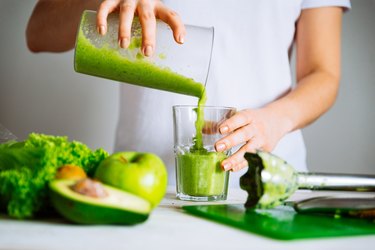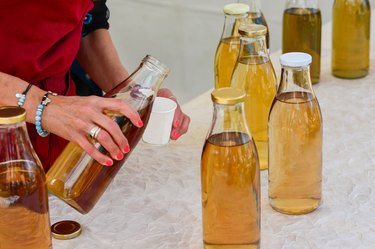
Yes, you can chill out without loading up on a ton of calories. The average American adult takes in nearly 150 calories per day from sugar-sweetened beverages alone, reports the CDC.
And according to USDA data, we drink 18 percent of our total daily calories. While sports drinks and sodas are the main calorie-laden culprits, even "healthy" drinks like juices and smoothies can add up.
"The biggest mistake I see my clients make is ordering what appears to be a simple, healthy and 'clean' beverage at their favorite coffee shop or restaurant and not realizing the amount of added sugar in their drink," explains Mary Stewart, RD, LD, a registered dietitian and the owner of Cultivate Nutrition in Dallas.
"If you're not sure if your beverage contains sugar, always check the ingredients and nutrition facts label before you buy. You have to be your own detective when it comes to packaged foods and drinks."
For example, drinking matcha green tea is a smart move because it contains powerful antioxidant properties. However, ordering a Grande (16-ounce) Iced Matcha Green Tea Latte at Starbucks isn't — their green drink contains 28 grams (or 7 full teaspoons) of sugar. Made at home the classic way, the same drink would have zero added sugars.
That's why it's vital to check the nutrition facts label and ingredient list to ensure your next cup isn't jam-packed with unnecessary sugars or additives.
Tip
Before we dive into healthy cold drinks for summer, it’s worth noting that the best and healthiest option is plain ol’ H2O.
“Many people are chronically dehydrated and water, by far, is the best drink to drink throughout the day. Our bodies are mostly made up of water and every function in the body requires it, so focus on water first. It’s naturally sugar-and calorie-free — and it’s free from your tap,” says Laura Burak, RD, CDN, a registered dietitian in Roslyn, New York.
1. Juices

The Health Benefits of Juice
"Juice can certainly have its place in an overall healthy diet. It can be rich in nutrients and antioxidants like vitamin C, carotenoids, anthocyanins and beta-carotene and also serve to support your hydration levels," Stewart says.
But those benefits only apply if your juice is made from 100-percent fruits and vegetables that are actually juiced — not "juice product," which is essentially water spiked with sweeteners, artificial colors and more.
If you struggle to get your recommended servings of fruits and vegetables each day (1 ½ to 2 cups of fruits and 2 to 3 cups of veggies per day, which, according to the CDC, only about 1 in 10 Americans meet), juice can be a simple way to supplement.
Since juices are a quick way to integrate on-the-go calories, Burak actually recommends 100-percent fruit juices to clients who need to gain weight in a healthy way.
The Health Drawbacks of Juice
That being said, for people who are seeking to maintain or lose weight, the main point of contention with juice is just that — each 8-ounce serving of a 100-percent fruit-and-vegetable blend contains 113 calories, per the USDA.
"Juices, whether they come from 100-percent produce or not, still contain large amounts of sugar. Eating the whole fruit instead of drinking juice will always be my top recommendation, as it contains fiber and more nutrients, takes time to eat and chew and has much fewer calories than just the sugary part of the fruit (which is the juice)," Burak says.
To put this into perspective for clients, Burak explains that a small orange contains around 50 calories and can take more time to chew and swallow compared to one cup of orange juice (which is basically the juice of several oranges) that can be downed in seconds — and for almost triple the calories and sugar.
The Best Juices to Try
Try our DIY Sweet Green Juice or no-sugar-added mocktail Green Mojito Blend. Then, learn more about the best juices to drink in the morning.
2. Smoothies

The Health Benefits of Smoothies
Similar to juices, smoothies are an excellent way to increase your vegetable and fruit intake. However, unlike juice, they contain the fruit's vital fiber, which primarly comes from the skin and pulp.
"Smoothies made with whole fruits and veggies are rich in essential nutrients, antioxidants, fiber and can support a healthy gut microbiome, lower inflammation and reduce your risk for diseases," Stewart says.
For the most body benefits per sip, your best option is to blend a smoothie at home, so you can control the ingredients and sneak in vegetables, like frozen spinach or riced cauliflower, and healthy fats, such as chia or flax seeds.
A healthy smoothie that contains only natural sugars will include real fruit, a source of protein (like plain yogurt, nuts, seeds, nut butters or protein powder) and an unsweetened liquid (like almond milk, dairy milk or water), Burak says.
"If you're buying a smoothie, ask questions and specify what ingredients you want to make sure there is nothing sugary added," she adds.
The Drawbacks of Smoothies
"Smoothies can be huge sugar bombs, so you have to know what ingredients were used to blend them up if you're purchasing one and not making it at home," Burak says.
Often, juice-bar or store-bought blends contain syrups, honey and/or sugar and fruit juice, which can all add up. Case in point: A "small" 22-ounce PB&J smoothie from a popular chain has 780 calories and 115 grams of carbs.
The Best Smoothies to Try
Before you plug in that blender, study up on five of the most common smoothie mistakes, plus more about how to make fruit smoothies that fit within an overall healthy diet. Then, try our hydrating Recovery Smoothie, anti-inflammatory Golden Smoothie or super-satisfying Smoothie Bowl.
3. Seltzers

The Health Benefits of Seltzers
Club soda, seltzer, sparkling water — whatever you call it, it's a nice way to step down from sugar-laden or artificially sweetened carbonated beverages but still get your fizz fix.
And as long as it is straight-up seltzer, this smart sip contains zero calories and is just as hydrating still water.
"Seltzers should have 0 grams of sugar listed in the nutrition facts. If you're not sure if your beverage contains sugar, always check the ingredients and nutrition facts label before you buy. You have to be your own detective when it comes to packaged foods and drinks," Burak says.
The Drawbacks of Seltzers
It's important to flip over that can or bottle because some sparkling waters pack sugar, artificial flavors or artificial sugar, Stewart says.
"For some people with digestive issues, consuming carbonated beverages could exacerbate symptoms such as gas and bloating," Stewart adds, but for most people, seltzer is a nice solution if plain water feels a little, well, flat.
Be sure to brush your teeth or eat something fairly soon after your seltzer break if it's citrus-flavored, the American Dental Association recommends. Since it has a lower pH than regular water and is more acidic, a consistent carbonated water habit might speed up tooth erosion if not neutralized.
The Best Seltzers to Try
Stewart's store-bought faves include:
- La Croix ($21.11 per 10-pack, Amazon.com)
- Waterloo (($14.49 per 12-pack, Amazon.com)
- Spindrift ($21.99 per 20-pack, Amazon.com)
- San Pellegrino ($21.96 per 24-pack, Amazon.com)
Or for a homemade solution, invest in a SodaStream like the Fizzi Sparkling Water Maker ($149.99, Amazon.com) so you don’t have to run out for a new pack of cans or bottles every week.
4. Kombucha

The Health Benefits of Kombucha
This trendy tea is essentially an effervescent, fermented drink.
That fermentation is the main reason why kombucha is being touted as a healthy cold drink: It means each under-50-calorie serving is full of probiotics that help promote good gut health.
"Although more studies on kombucha are needed, some have shown that it can improve digestion, offers antioxidants that can decrease inflammation and contains antibacterial properties that kill off harmful bacteria in the gut," Stewart says.
For the most health benefits per booch, choose one made with green tea since this tea is well-studied and might contribute to increased metabolism, Stewart adds.
Again, just be sure to check the label to make sure there is no added sugar in the product (which is now required to be listed on the nutrition facts panel). There will be some natural sugar from the fermentation process but beyond that, nothing should be added.
Aim to snag a bottle that has less than 8 grams of sugar per serving (10 grams, max), and stick to no more than 8 or 12 ounces per day since more studies are needed to prove the long-term health effects.
The Drawbacks of Kombucha
Kombucha does contain a small amount of alcohol from the fermentation process. So if you are pregnant or abstain from alcohol, please use precaution and speak to your health care professional before adding it to your diet.
Since it's fizzy, those with sensitive stomachs might experience increased feelings of bloating or gas, Stewart says.
Most importantly, if you're going the homemade route, it's critical to properly prepare your kombucha since the live yeast used can become contaminated with wild yeasts or toxic molds that can lead to nausea or allergic reactions.
The Best Kombuchas to Try
If you prefer to steer clear of the chemistry required for homemade kombucha, try our go-to brands below:
- GT’s Kombucha ($9.29 per 48-ounce bottle, Amazon.com)
- Health-Ade ($2 per 12-ounce bottle, Amazon.com)
- Brew Dr Kombucha ($2.24 per 14-ounce bottle, Amazon.com)